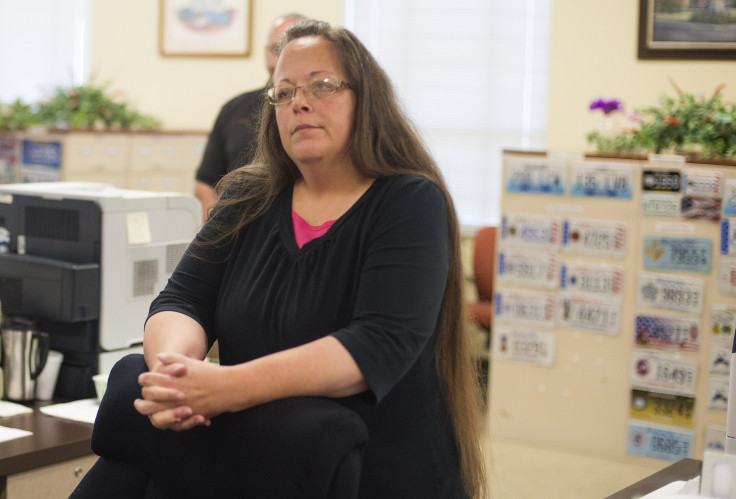Mormon Church's Criticism Of Kim Davis Signals Shift In Approach To 'Culture Wars'

The Mormon church has held tightly to its doctrine decrying homosexuality and gay marriage, but it had been mostly silent on one of the most contentious issues in the gay rights debate this year: the actions of Kentucky county clerk Kim Davis, who refused to issue marriage licenses to gay couples on the grounds that it violated her Christian faith. The church's tone shifted slightly but significantly on Tuesday, when a high-ranking church leader said in a speech that Davis was wrong to shirk her responsibilities by invoking her religion.
Public officials “are not free to apply personal convictions -- religious or other -- in place of the defined responsibilities of their public offices,” said Dallin H. Oaks, who serves on the Quorum of the Twelve Apostles, a governing body in the Church of Jesus Christ of Latter-day Saints. The speech, titled "The Boundary Between Church and State," was delivered at the second annual Sacramento Court/Clergy Conference in California.
The comments signal a shift in the approach the Mormon church has taken in the so-called culture wars. While it is not deviating from its stance against homosexuality, the church initiated a gentler approach with the move, perhaps in an effort to avoid a blistering public relations backlash as it faced in the early 2000s, when the church was a vocal opponent of legalizing gay marriage.
While Oaks did not name Kim Davis in the speech, references to the controversy were obvious and later confirmed by church officials. Oaks said citizens in a democracy are bound by the governmental law and court rulings, even when conflicts between religion and law arise.
"Government officials must not apply these duties selectively according to their personal preferences -- whatever their source. A county clerk’s recent invoking of religious reasons to justify refusal by her office and staff to issue marriage licenses to same-gender couples violates this principle," said Oaks, who once clerked for U.S. Supreme Court Chief Justice Earl Warren. Oaks also worked as a prosecutor in Illinois and served as a state supreme court justice in Utah.
He added that "believers should acknowledge the validity of constitutional laws. Even where they have challenged laws or practices on constitutional grounds, once those laws or practices have been sustained by the highest available authority, believers should acknowledge their validity and submit to them."
The Mormon church is not the first major religious institution to take a softer approach: Pope Francis has led the Catholic church in a similar direction, not altering its religious doctrine but de-emphasizing the church's focus on issues of sexuality. When news broke that the pope met with Davis in a group visit during his trip to the United States in September, the Vatican swiftly issued a statement saying the meeting "should not be considered a form of support of her position in all of its particular and complex aspects" in an effort to distance itself from the controversy.
In a recent forum of presidential candidates at the Prestonwood Baptist Church in Plano, Texas, Sen. Ted Cruz said that "2016 is going to be a religious-liberty election," and the term has become a hot button for conservatives. But not everyone in the religious liberty movement agrees on how to best defend religious liberty -- a sign that the movement is starting to splinter.
The Rev. Gregory Johnson, chairman of a group of evangelical Christian churches in Utah, disagreed with Oaks' comments.
“Conscientious objection and religious exemptions are part of our country’s heritage,” said Johnson. “When fighting in wars or endorsing or participating in a marriage you think does not honor God’s design for marriage, such people have to be accommodated.”
Mat Staver, a lawyer for Davis, told the Associated Press that the Mormon church's tactic "may sound nice, but it ends up not pleasing anyone. You need to stand on principle."
© Copyright IBTimes 2024. All rights reserved.





















